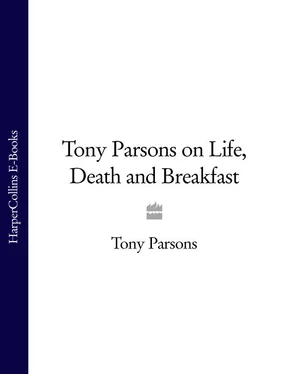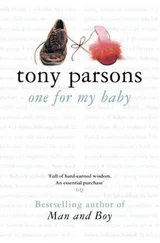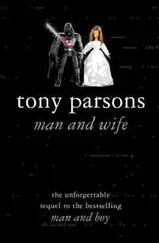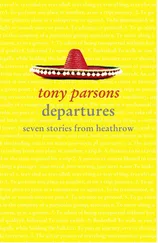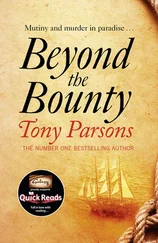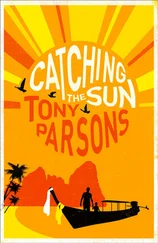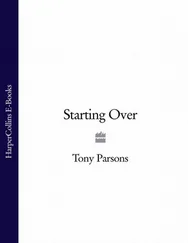tony parsons
on life, death and breakfast
For Dylan Jones From the Roxy to eternity
Introduction
One The Mid-Life Myth
Two When Yobs Swear
Three Dying Parents
Four Angry Old Man
Five Fear of Fake Breasts
Six Humiliation
Seven Tough Guys Get Facials
Eight You Only Wed Twice
Nine Getting Tested
Ten A Complicated Young God
Eleven The Gunfire Next Door
Twelve Performance Anxiety
Thirteen Love Handles, Actually
Fourteen Man and Boy Racer
Fifteen Junk Sex
Sixteen Tough Girls
Seventeen A Bigger Cock Than That
Eighteen Faulty Modern Men
Nineteen Get Fit with Fred
Twenty Gentlemen, Please
Twenty-One How to Be Happy
Twenty-Two New Man, Old Lad
Twenty-Three Fever Bitch
Twenty-Four Double Standards Now
Twenty-Five Fake Breasts Don’t Bounce Back
Twenty-Six The Secret of My Failure
Twenty-Seven Why Men Stray, Why Men Stay
Twenty-Eight The Formerly Young
Twenty-Nine Big World, Small Society
By the same author
Copyright
About the Publisher
When I was a washed-up music journalist, wondering what to do with the rest of my twenties, not to mention my life, the telephone rang.
It was a friend on a women’s magazine. She wanted to know if I would write something for them. One thousand words on ‘Commitment’. The man’s view. Sure, I said, before she had a chance to change her mind. I was desperate for work, and the red bills were piling up.
And that phone call saved my life.
Because when I sat down to write about commitment for my mate on the women’s magazine, I discovered my subject.
Sex. Romance. Fathers. Sons. Men and women-especially that-how we struggle to find love, and what we do with it when we find it.
The great game that never ends.
My subject had been music, but that had gone by the time I was twenty-five. The musicians I had known, and loved, and written about, had all moved on. Some of them were trying to crack America. Some of them were dead. Some of them were trying to hold on to their sanity. But nobody was where they had been any more.
I had joined the NME at twenty-two and it was what I did instead of university or National Service. I went in as a boy and I emerged as a man. Or, if not exactly a man, then at least a boy who had taken lots of drugs and met Debbie Harry. But it was never meant to last forever, and it didn’t. By twenty-five I was out of a job, and penniless, and a father. By twenty-nine I was out of a job, and out of a marriage, and penniless, and a single dad.
So whatever way you looked at it, things were definitely going downhill.
I had dropped out of school at sixteen with wild, impractical dreams of being a writer. After years of low-paid jobs that ended with the night shift at Gordon’s gin distillery, I landed that job on the NME. They hired me because I had published a novel called The Kids -exactly the kind of callow, feverish rubbish that usually remains mercifully locked in some teenager’s bottom drawer-and, far more importantly, I looked quite good in a cheap leather jacket.
I was a writer at last. But in the music press, the only vocational training I ever received focused on teaching me about taking drugs with rock stars. How to pass a joint to Bob Marley. The correct etiquette at a Keith Richards’ heroin bust. How to offer Johnny Rotten some of your amphetamine sulphate without making some dreadful faux-pas. When I was on the NME , the creative writing thing was far less important than being able to hang out with Iggy Pop all night. I really wanted to write-it was the only thing I had ever found that I was halfway good at-but after leaving the NME , I found I had lost my subject without even really serving my apprenticeship.
Until I got that phone call.
So I wrote my little piece on commitment. And then I started to get other phone calls. The same sort of thing. And I realised that I loved it. Writing about the great game. Men. Women. Family. Fathers and sons. Husbands and wives. Sex and romance and what happens when you can’t tell the difference. And the happy days when there really is no difference. How we feel when it all comes apart, and how we never stop hoping that we will get just one more chance to get it right. Becoming a parent and watching your own parents age and die. Finding love and then misplacing it somewhere, or having it snatched away from you.
The money wasn’t terrific, but it was a living, just about-and I hadn’t been making a living for a long time.
Money had not been important when I was at the NME. After a night of rock and roll decadence, me and Julie Burchill-then my girlfriend, later my wife, and a bit later still my ex – wife – would often take R. Whites lemonade bottles back to the local shop, collect our tube fare, and go to work, giggling like a pair of happy urchins who were exactly where they wanted to be. We didn’t need money. Apart from the deposits we claimed on lemonade bottles to pay our tube fares.
But then I became a grown-up–with a wife, and a baby, and a divorce, and a broken heart, and a broken boiler, and bills that I could not pay. And money would matter from now on because I could never again pay my way in the world by taking back a few R. Whites lemonade bottles.
Don’t you hate it when that happens?
I could have made the music thing last a few more years. I was still young. I still had my leather jacket. Ian Dury wanted me to go on the road in America, and Madness seemed like nice boys-but what would have been the point? I would have been faking it. The bands that I had really loved were else where–on Top of the Pops or fighting heroin addiction or recording their difficult second albums in New York. Staying up for three days and nights in a row loses its appeal after a while. And I had a little son. And going to America with a band could never have been the same again.
What I remember most about my days on the NME was going to the Speakeasy with an unknown, unsigned young band called The Clash … and being turned away because we were not sufficiently cool. Not them. Not me. Not even the whole job lot could scrape together the cool quotient required to get us into the Speakeasy. Somehow I cherished that memory above the others. But those days were gone. And with them went my career.
That phone call from my friend on the women’s magazine gave me back my career. It was the mid-eighties, and a great time for magazines, and for newspapers. Looking back, they seem like the last of the boom years. With the Internet still some years away, there was suddenly all this space to fill. And although my early gigs were all on women’s magazines, or on the women’s pages of national newspapers, soon there were all these magazines for men that were not simply about fishing, or football, or the new Ford Mondeo.
After the storming success of The Face , my old NME editor Nick Logan started Arena , the first British magazine for men, and that opened the gates for Esquire, Loaded, FHM, Nuts and British GQ – where many of the articles included here come from.
It gave me more than a living. It gave me confidence. When my mother was dying of cancer, and my little son was not quite so little any more, I felt totally poised between the generation that came before me and the generation that came after me in a way that I never had before-or since.
I sort of got it-the cycle of life thing. The way that, in the end, you lose everyone-your parents get old and die, your children grow up and leave you-and although it breaks your heart, it is the most natural thing in the world.
Читать дальше
